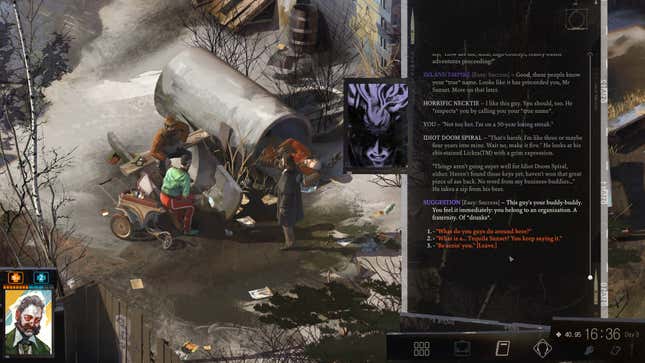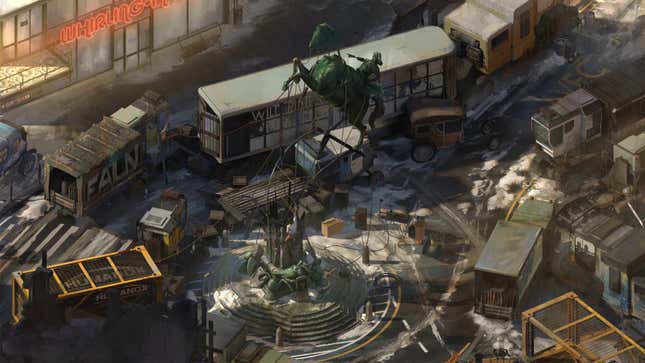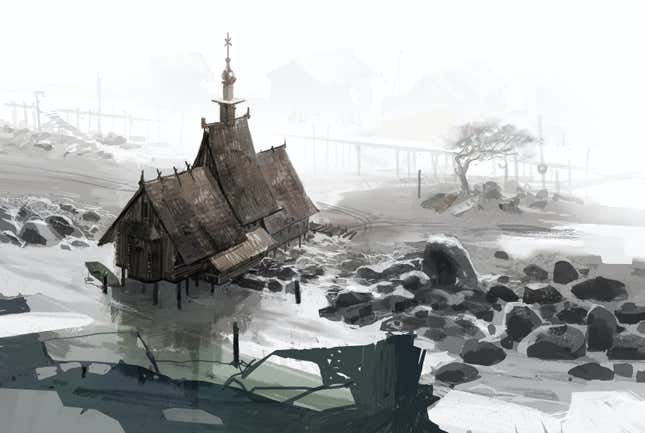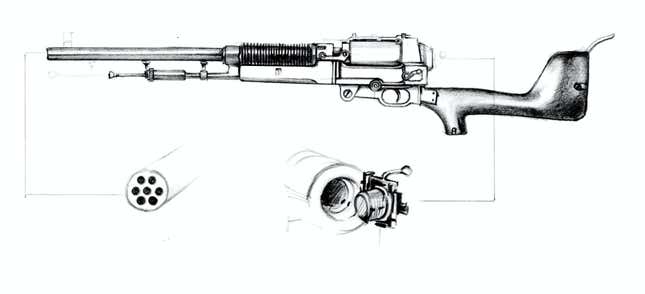Disco Elysium is a game about three bullets. The first was fired over 40 years ago, and ignited the revolution that brought Revachol to the edge of something new. It has since been lost, but its many kin define the pox-scarred skin of this city. The second was shot through the throat of a security officer mid-climax. He is hanging from a tree outside of a hotel, so the hole it left is hard to find until you cut him down. The third is embedded in the pelvis of Detective Harrier “Harry” Du Bois, your player character. It is in good company with the other two, or three, bullets inside of his body.
In its opening minutes Disco Elysium shows us a man on fire. He is broken, in more ways than one. Following a multi-day (or multi-year, depending on how you count these things) bender, he awakes naked in his hotel room, having completely obliterated his own memory. When he finally assembles his clothes, remembers his own face (or doesn’t), and stumbles out into the world, he is informed by a woman he is uncomfortably attracted to that the last thing anyone heard from him was the phrase “I DON’T WANT TO BE THIS KIND OF ANIMAL ANYMORE!” shouted from inside his hotel room. Oh, and also that he’s a police officer who is currently investigating a murder.
Revachol City Militia Officer Harry Du Bois is a very sad man, which you can tell because he screams a lot and is often afraid. This is because Disco Elysium is very good at making you understand what happens when trauma becomes trapped inside a body—when it is riddled with bullets.
Upon making contact with a human body, a bullet will deform, ricochet, and splinter. To remove it completely you must find each shard and pull it free. This is a kind of reconstruction. The process can take hours.
When President James A. Garfield was shot, doctors were unable to find the second bullet embedded in his body. Alexander Graham Bell attempted to use an early version of the modern metal detector to locate it. The machine reported that the bullet was embedded in Garfield’s abdomen and the doctors, satisfied with this answer, let it remain there until his death.
During his autopsy the bullet was found to the right of his spinal cord wrapped in scar tissue. Bell, disappointed by this discovery, went on to perfect the metal detector.
The bullet lived in Garfield for eighty days. I imagine it died with him.
The first time a girl touched my thigh, something inside of me said she was trying to kill me. And so I pinned her to the bed, terrified. Dear reader, she was not, in fact, trying to kill me. This is what trauma does—it sets the body in a permanent state of high alert. Neither the body nor the mind are built for this. Continuous trauma can force both to fracture, which is how we get Disco Elysium’s brilliant central conceit: That Harry Du Bois has been broken into pieces, that the various parts of him are in constant conversation with both his central self, which the player controls, and with each other, tagging along like unruly passengers, often arguing with each other in the backseat. It turns trauma into a stats system.
Disco Elysium breaks its 24 skills into four overarching attributes: Intellect, Psyche, Physique, and Motorics. These attributes determine the maximum value of every skill underneath their umbrella. Intellect is how you think, Psyche is how you feel, Physique is the makeup of your body, and Motorics is how that body is used.
Building your character in Disco Elysium is about choosing which parts of yourself will be the loudest and most developed. But all of these parts are, to varying degrees, afraid. And those differing fears lead to their differing motivations and the very different ways they talk to you.

So skills like Encyclopedia and Authority aren’t just skills, they’re facets of your personality, shaped by trauma like everything else jumbling around inside of Harry. These two are both afraid of losing control, but they imagine that control in two very different ways. Encyclopedia is afraid of not knowing, or appearing to not know, and so constantly spews mostly useless facts at you. Authority’s fear of losing control centers on the more traditional sort: your ability to socially dominate others, to wield power, and to get your way. Authority constantly talks to you about power, and becomes angry when it feels social systems of dominance and submission aren’t being respected. These same questions of fear and the voice through which those fears manifest extend to virtually all of Disco Elysium’s stats, with one notable exception: Shivers.
I would argue that Shivers is Disco Elysium’s most important skill—it is, after all, the one used for the game’s only required skill check. It is also one of its quietest and its most confident. Unlike the other skills, Shivers never argues with its kin. It will occasionally nudge you in a particular direction, but most of the time it just wants to tell you a story. And it is very good at telling you stories. Stories about trains and ghosts and architects. Most of the time they’re a handful of sentences, sometimes a paragraph or two, but Shivers never overstays its welcome. And they are never about you or Harry, only ever about Revachol and the people who have lived beautifully within it. It is also unique from the game’s other “Lore” skills, like Encyclopedia and Inland Empire, because of its parent attribute: Physique.
Trauma forever marks the body. PTSD rewires the brain and permanently elevates stress hormones. These elevated stress hormones can be passed to a child through the womb. We call this generational trauma.
Now, imagine what happens when a city bleeds.
Disco Elysium names the resulting phenomenon Shivers.
Processing trauma also demands a kind of reconstruction. The inciting incident must be rebuilt inside the body before it is removed. I do not know who shot first. So let’s begin before the first bullet was fired.

Martinaise, the Revachol district within which Disco Elysium takes place, is sick. There is a body hanging from a tree, it has been there for over a week now. This is not normal for Martinaise, but for most people it is acceptable. Children, trapped in a haze of drugs and trauma, treat it like a plaything. The district has been sick for a long time.
The Antecellian Civil War destroyed Revachol’s monarchy, so the rest of the world destroyed the city. Following a successful Communist revolution the Coalition of Nations (the game’s U.N. equivalent) unleashed a swift and violent campaign known as Operation Death Blow. Martinaise was one of its primary targets. The district was all but obliterated by artillery, and it has not recovered in the five decades since. This was the trauma that has since seeped into the bones of the city, that has suspended so many ghosts in amber.
The first day, or days, of Disco Elysium revolve around getting that dead body out of the tree. You can go about doing this many ways. You can shoot it down, get someone else to pull it free, break the branch it hangs from, the list goes on. This is both your first opportunity to see the skills system in motion, and also your first opportunity to interact with Martinaise and its people directly. And they are not used to dealing with police.
Martinaise is an orphaned district, caught in the limbo between two precincts—neither of which claim to want it, but both do. To police Martinaise is an inconvenient point of pride, which is why each precinct sends an officer to investigate the corpse hanging outside of the Whirling-in-Rags hotel. Your player character Harry Du Bois is one, and Detective Kim Kitsuragi is the other. Both men care very much, which makes them terrible at being cops and excellent at solving crimes. Most RCM officers are only good at shooting people, and even that is a struggle.
In his book La Violence et Le Sacré, French theorist Renée Girard argues that the reciprocal nature of violence causes it to act like a disease. The function of ritual sacrifice is to stop its spread. When someone from Group A kills someone from Group B, Group B will desire retribution and will then kill a member of Group A. Group A will then want their own revenge, and the process will repeat until everyone is dead and all social bonds collapse. Violence is infectious and corrupting. Girard claims that this, in addition to bloodborne pathogens, is what leads so many faiths to treat blood as unclean. He then goes on to argue that the modern judicial process is, itself, a ritual act.
The most effective way to remove a broadhead arrow embedded in a human body is to push it through. Attempting to pull it out will only further devastate the surrounding tissue. To begin healing, then, the violent act must be completed. This is the function of sacrifice. When the ritual victim is killed, the spread of violence stops because there is no one left to visit vengeance upon. You cannot spite a god, after all. The arrow, once removed, is stripped of its power. But we do not often shoot each other with arrows anymore, do we?
This is all to say that the people of Martinaise are more than reticent to talk. Your official powers do not carry much weight here as the local Dockworker’s Union has become the de facto government of the area. Said union is currently mid-strike, which is what brought the private security officer who is now just a body hanging from a tree. When you arrive, the tension is palpable and the air smells like corpse.
Your investigation proceeds from here. You make connections with cryptid hunters, cursed bookstore owners, a union boss, a corporate negotiator, some fucked-up kids, a mom who is trying very hard, and a bunch of incredibly weird and thoroughly traumatized punks. You meet a lot of people, most of whom I did not list, and Disco Elysium extends its sense of empathy to almost all of them. Harry is good at his job because he is, to varying degrees depending on your build, a fucked up and caring weirdo. His weirdness disarms people, and his genuine care actually gets them to open up. The investigation itself becomes a catalyst for processing communal trauma.

I mentioned earlier that the game has one required skill check, the rest are optional. This is a Shivers check to determine the location of a person of interest, who you would have no other way to track down. The check is obscenely difficult, even a character built for Shivers would struggle with it. However, completing side quests in the area of Martinaise where the check is located boosts your chances of completing it. Fully embedding yourself within the district makes the check impossible to fail. The only way to solve this murder, and attempt to heal this community, is to stop acting like a cop and become a part of it.
But at the game’s highest point of tension, you are a cop first and foremost. And the world will not let you forget this.
The history of policing is long and brutal. It is doubly so for private security forces.
The majority of training, for both police and private security, is spent teaching people not to hesitate before pulling a trigger. This is because human beings are usually reluctant to kill one another. The goal then, is for the gun to become reflexive—for it to become an extension of the body.
Over time and through repeated acts of violence, the police body becomes synonymous with a gun. Because of this, the presence of a police officer can immediately escalate a situation. How can a gun do anything else?

On Disco Elysium’s fourth, and second to last, day, there is a standoff between private security officers (the colleagues of the corpse) and the local union enforcers who they have deemed guilty of his murder. When you arrive you can attempt to de-escalate things. You cannot succeed in doing so. And then the shooting starts.
Depending on your rolls and priorities, some players will survive the encounter and others will not. Regardless, a bullet will be fired into Harry’s pelvis, and he will black out for two days. It is not the first bullet in his body. The game references two others, from previous cases.
But there is a third bullet inside of his body. Harry Du Bois has been sick for a long time, too.
There is a presence at the edge of Disco Elysium: Harry’s ex-wife. The game speaks of her like a violent, incomprehensible angel. Whenever she crosses his mind it hurts. God it hurts. She is the person who pushed Harry to join the RCM. She is the person who watched him become increasingly traumatized by, and skilled at, his work. She is the person who, rightfully, walked away and broke him. He loves her still, six years later. In no small part because he has done everything he can to avoid being alive in that time. This is what ignites Harry’s six-year bender. It is this divorce that is embedded somewhere in his body, that secret third bullet leaking metal into his blood.
and i am not an expert on bullets. but
upon contact with a human body the blunt head
compresses skin through sheer velocity
until it rips. the spat of blood does not come
from the severing of any particular vein, but
from the sudden displacement of life. at this point,
flesh ripples and bone breaks as energy is dispersed through it.
this portion of the body is killed almost instantly.
the rest comes later
If Harry confronts this past in full, you are presented with two potential thoughts. Thoughts in Disco Elysium are ideas or processes your character can internalize. Everyone can think about communism, for instance, but few people choose to internalize it. If you have a high enough Interfacing score you are presented with a thought called White Mourning. If you have a high enough Conceptualization, you are offered The Bow Collector. Both thoughts are ways for Harry to process the pain he has carried for so long. Both can be considered and internalized.
The full text of White Mourning is painful:
You see yourself from above. You’re passed out on the blue tiles of the hostel room floor. Even from this distance you can see your eyelids flutter — at the mention of what? A great white object, letting out its sweet smell, like a Lily of the Valley. The little man’s forgotten its name, but he still remembers the feeling. And look, he moves! The feeling animates him. He instinctively reaches out for the feeling’s best friend — a bottle of Commodore Red. He puts on his disco clothes and gets smaller and smaller…
...and the little guy gets smaller and smaller as you rise above the doll house world. You see him out in the snow, on the streets, in the shop on the corner, and, finally, in a matchbox house. Sitting by the window, white flowers on the windowsill. You can smell them from up here: it’s awful. A white mourning. A modern death. Divorce, or something similar. All you can do is put more distance between you and him, make him smaller. Make him less *you*.
Internalizing White Mourning pulls the camera back. Harry’s body, on the screen, becomes literally smaller and the world so much bigger. He takes in as much stimulus as he can in order to dissociate from his own personhood. This is one way of coping.
The Bow Collector is similarly painful, but it is also one of the most beautiful things I’ve ever read:
Sparks fall like snow from the bow collector of streetcar no 42. Slowly down the slope from Voyager Road and then east on the B206, across the river, to where there are no closed factories or ruins. To study. At the academy. Electrical cables run overhead and the bow collector draws across them like a musical instrument. A flash. She’s standing at the rear window, holding onto the rail. In a spring coat, waving at you…
It’s early in the morning. The world is dark blue. The sparks light her face. A delicate composition of triangles. The street seems to grow longer, like in a dolly zoom. And there’s something in the air as you stand there and wave back at the shape growing smaller and smaller. Something that has *always* been there. A great see-through world. The tenderness you feel. The ghost of Revachol between you, carrying your signals. The holy messenger.
Internalizing The Bow Collector boosts your Shivers score by three, making it one of the most powerful stat boosts in the entire game. In this thought your love, and trauma, become mediated through the city itself. It always was, you just could not name it yet. To love her was to love Revachol, was to wield and be wielded by the city as a brush. You can still do that, Harry.
So raise the hairs on your neck, and drive your nails down to the marrow of the city. Start pulling out bullets.
i once read that “the body opens to receive the bullet,”
and i am not an expert on bullets, but
i think it would be more accurate to say that “the body,
open, closes around the bullet.” it does, after all
embrace it in scarring and necrotic tissue.
the “bullet” then, is a statement. The
(bullet) then, is an aside. a bullet, then,
is not a period (it would be easier if it were a period),
but is instead everything that happens between them.
i dont know what to do with that
And so, after you are shot, you sail to a little island to solve a mystery. You know that this is the only place the inciting bullet of this investigation could’ve come from. You do not, however, have any idea who could’ve fired it. The ride over is quiet and beautiful, and if you have a boombox you can skip music across the water. You and Kim do not talk much, as you are tired and ready to be done.

And then the boat lands on the shore. You get out and walk across this little rock in the sea. It used to be a military installation. It was among the primary targets of Operation Death Blow. It is why Martinaise burned. And so you walk it like a graveyard. You find an old man with a gun. He is broken by the world and full of bullets, almost like you, Harry. He lived the revolution, loved it actually. Married himself to it. And it was murdered. So he sits on this shitty little island, alone. He eats rations and watches the city through the scope of his rifle. He hates it. Every bit of it. He is a warning of what you might become.
He hates the woman who was fucking the security officer whose throat he shot. He hates the union for being liberal collaborators. He hates the bookstore owner for her attempt at enterprise. He hates all the people trying to make a life in this world for not hating it as much as he does. He is possibly the saddest character I’ve ever seen in a video game. I mean that as both a judgement and an accurate description of him.
He tells you his story. You tell him that you will bring him in for questioning. While on this island you can talk to a cryptid about philosophy, it’s optional. You can discuss how you see the world with the cryptid, and what kind of animal you have decided to be, seven days since the booming proclamation you made that last night in the hotel. It describes its own world as a vision in stained glass. An onslaught of stimuli that you look at and process. It does not think much, nor does it feel often.
It is describing the drug haze that you lived for six years, that desperate drive to be anything else. A White Mourning. At one point it asks you how you feel about that way of being. You can say something like, “I think I want to be that kind of animal,” the kind that never touches the world, or allows itself to be touched by it. The cryptid is disappointed by this answer, especially after all you’ve gone through, all the beautiful and terrible things you have lived and done. After all, you yourself have admitted that you do not want to be that kind of animal anymore. Eventually the conversation ends, and you leave the old man on his island for now. He isn’t going anywhere. You will get him later.
There is a long boat ride back. You arrive to see a few members of your precinct standing on the dock. They have watched you burn for over five years, and they are here to tell you that your job is done. That you are too broken. They ask you to explain the last seven days of your life to them—it has been a particularly egregious shitshow from their perspective.
And so you’re left standing there, dumbstruck on this stupid fucking dock, having to explain to everyone who still gives a shit about you why they shouldn’t just walk away. And so, Harry, you cough up handfuls of spent shell casings, pounds of lead from your throat. A failed revolution you did not even witness. Forty years of strangled city. A stupid fucking divorce, of all things! And one week free from most of it. One week where you didn’t have to think about all the things that were wrong with your life. And then you were shot and solved the case anyway. You wax rhapsodic for hours about dice makers and dead men and impossible animals. It is a desperate and brilliant act of self redefinition through storytelling.
Shivers, the investigation, Harry’s own internal discourse and final testimony. All of it in service of producing narratives strong enough to cope with trauma after trauma, and realizing that, despite all the broken things inside of you, you can still touch and be touched by other people. Yes, Harry is a fuckup. But he’s still going. He wants to be better, and I cannot help but think he will do it.
This is why I love Disco Elysium. Why I think it is one of the most shit-stained, beautiful, and hopeful games I have ever played. Throughout its entire length it never fails to give testimony to the pain and splendor of Revachol and of life. I have thought about it every day for the last year and a half because it was the game that helped me learn what to do with my own bullets.
Tell stories and never stop, even when it hurts. Reach into the holes and pull out lead. Plant seeds in the wounds, and then watch them bloom.
you tell the stories again and again and again and .reconstructed. they pass cleanly through
.
